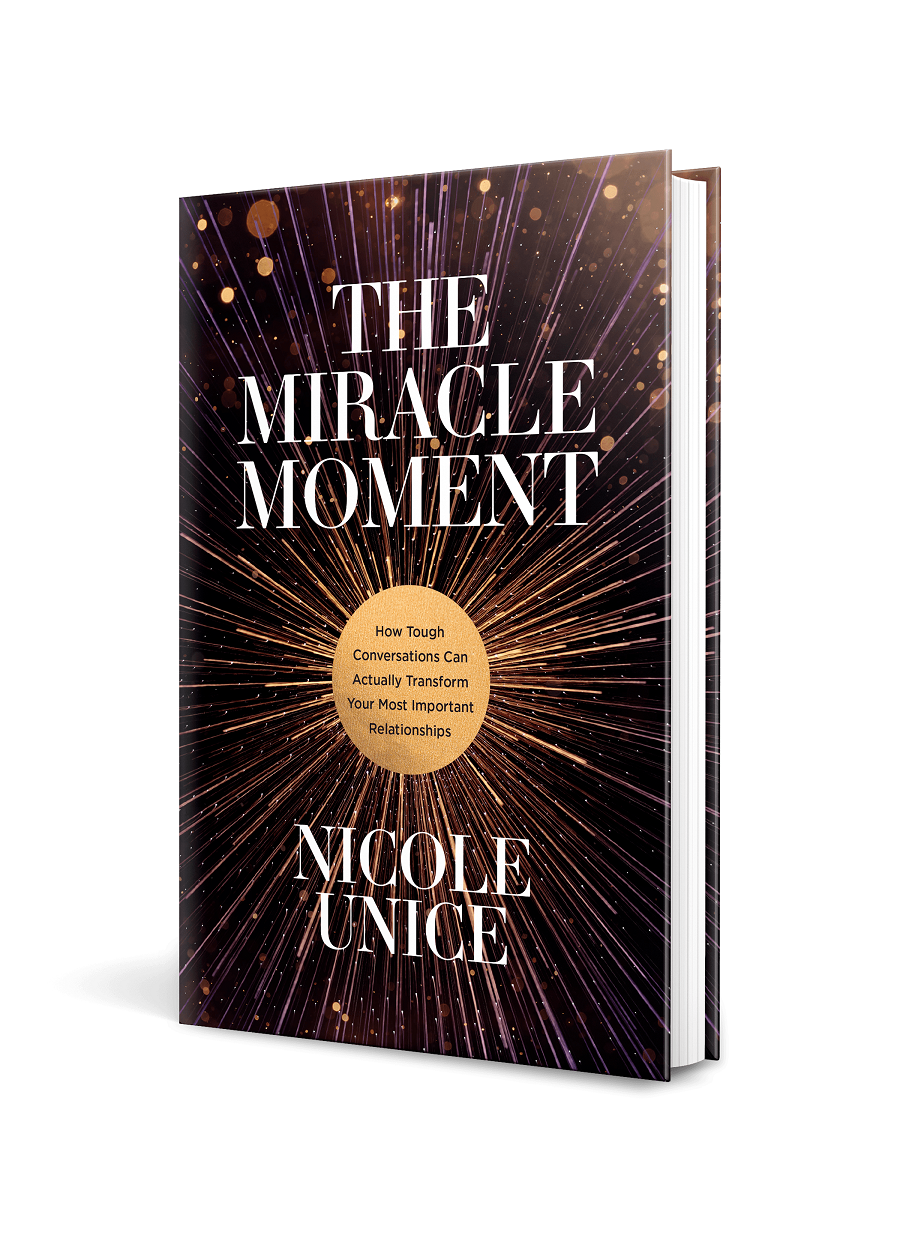Defining and enforcing boundaries doesn’t have to be scary or confusing. Much like our emotions, when boundaries are healthy, they give us important signals about how to protect ourselves and love people well.
Excerpted from The Miracle Moment by Nicole Unice
At their simplest, boundaries are what separate us from other individuals. They are the invisible barriers where I begin and you end. Boundaries can vary and change over time and with different people. John Townsend and Henry Cloud, the guys who literally wrote the book on boundaries,1 explain that your personal boundaries are like the fence around your house that keeps bad things out and good things in. Fences also have gates—openings where people can enter and leave. To have a boundary is to build the fence that gives you freedom to live within the parameters of your personal responsibilities with joy and freedom. When our lives have fences, we have clear markers on what is OK and not OK for ourselves and those around us. Ironically, drawing those lines actually leads to more freedom, not less. Healthy boundaries enable us to explore, express ourselves, and grow. Healthy boundaries help us keep unsafe people out and let trustworthy people in. Setting and maintaining them is a critical cornerstone of our self-respect and integrity.
We are not bothered when people erect fences around their personal property, but many of us are surprised or disturbed to know that our personal self also needs boundaries to keep the bad out and the good in. But when you think about it, all of creation was made with boundaries:
Plant and animal cells have cell walls or membranes, designed to be the first line of defense against intruders and to provide the structure needed to thrive.
Animals have instincts and adaptations that allow them to thrive in different environments, as well as defense mechanisms that allow them to ward off danger.
If a deer eats a branch from a tree sapling, the animal’s saliva triggers the tree to produce bitter-tasting sap and “healing hormones” to speed recovery and ward off future attacks.2

Clearly, God has designed creatures with the boundaries they need for safety—and built in consequences for anyone who violates them! Yet when it comes to boundaries, the most unusual creature is the human being. We come into the world defenseless. We take longer than any other creature to grow into maturity. Studies are exploring the idea that the energy needed for brain development is what prolongs our childhood.3 It stands to reason that our greatest line of defense is not our strength or physical defense mechanisms, but our intelligence. Our boundaries are real but invisible modes of protection we create using our most incredible resource—our brain.
So what does a boundary look like for us? A boundary is a clear expectation of what you will allow and not allow with others, including the right to:
-choose the emotional and physical space between you and another person,
-decide how and when you will use your resources (time, money, energy),
-express your desires and opinions without being manipulated or gaslighted4 into believing your views are not valid, and
-clearly set out your own boundaries and enact consequences when they are violated.
It’s easy to skim that list and feel pretty confident that you know what your boundaries are. But they can be tricky. Consider the following scenarios:
-Your adult child wants to move back home to attend graduate school. Are you obligated to say yes? If you do say yes, how should you handle things like rent, household chores, groceries, and friends?
-Your husband has been spending money on his guys’ night out beyond what you think you can afford. When you bring it up to him, he says you are being a tightwad and that he “earns the right to have a little fun now and then.” He is the primary breadwinner in your home. What’s your next move?
-You’ve heard from coworkers that your boss is subtly criticizing the way you’ve been leading your direct reports, but she has not come directly to you. What do you do?
-Your girlfriend has a child from her first marriage. The two of you are getting more serious, but you are bothered that she seems to be constantly caught up in the custody drama with her ex and gets defensive if you try to talk about how to balance her parenting and your relationship together. Do you say something or stay quiet?

When we put real-life scenarios in place, we find that boundaries, like relationships, are hard to maintain. Our relationships require us to make difficult decisions, and we come to scenarios like the ones above with a set of beliefs based on our own experiences as well as what we have learned or believe about love, responsibility, conflict, and compromise. As we become aware of what we value in life, those invisible boundary lines become clearer in our own minds. Often it’s when our boundaries are pushed or violated that our souls sound the alarm—and we can choose to work on our self-awareness and self-expression so we can put words to our experiences. But none of it matters if we don’t actually follow through on our intentions.
One of the misconceptions people have about boundaries is that they are inherently selfish or lead to loneliness or isolation. Nothing could be further from the truth. Knowing and living by your boundaries allows you to express love—not out of resentment or obligation, but out of generosity and freedom. Boundaries allow you to use your resources in a way that aligns with your purpose and values, rather than feeling that you have to live your life by other people’s standards.
Boundaries make you a safe person—people around you can trust you because your words and actions line up. Boundaries are also flexible. When you know where your fences are, you can decide when you want to open the gate and let someone in. You bear others’ burdens with intention, not with frustration. You are the gatekeeper of your physical and emotional space and your precious resources, and you model for those around you what it looks like to live with a healthy sense of self. That’s why boundaries—and the integrity to act on them—are the ultimate form of self-respect.

Most of us struggle with our boundaries in at least some relationships. You may be a great boundary keeper at work but struggle to maintain them with your spouse. You may be great at friendship but can’t seem to enforce boundaries with your adult child. Perhaps you have a loved one who struggles with addiction, depression, or other chronic crises. Every time they need something from you—time, money, or emotional support—you are convinced this is the last time you will offer it. It feels heartless and cruel to not respond to their needs, but secretly you are beginning to dread interactions with them.
You may also struggle when you need to reset your boundaries with someone. It may be because they have broken your trust and are no longer safe. Or you may discover some of your friends drifting away once you are more assertive in your relationships. Perhaps you and your spouse are approaching the empty nest and have wildly different ideas on what the next season of life will look like. How do you apply boundaries then?
Defining and enforcing boundaries doesn’t have to be scary or confusing. Much like our emotions, when boundaries are healthy, they give us important signals about how to protect ourselves and love people well. Knowing and honoring your boundaries is empowering. Your ability to honor your boundaries is what makes you a safe, sound, and secure person. You trust yourself—and others trust you too.
- John Townsend and Henry Cloud, Boundaries (Grand Rapids, MI: Zondervan, 1992).
- Anthony Bouchard, “Trees Have a Defense Mechanism against Being Eaten,” LabRoots, September 23, 2016, https://www.labroots.com/trending/plants-and-animals/4153/tress-defense-mechanism-eaten
- Priyanka Pulla, “Why Do Humans Grow Up So Slowly? Blame the Brain,” Science, August 25, 2014, https://www.sciencemag.org/news/2014/08/why-do-humans-grow-so-slowly-blame-brain.
- A full definition of gaslighting appears in the next chapter. Simply put, gaslighting is a tactic used by someone who wants to make you second-guess or doubt your reality.
The Miracle Moment by Nicole Unice
There’s a moment in every conversation that can change the whole relationship. A moment when you can either move toward the other person or away from them. Choose to break a negative cycle or continue it. Understand and be understood or remain confused and frustrated.
It’s the “miracle moment.” And once you learn how to recognize and respond to it, it holds the power to help transform the relationships you have—at home, in love, and at work—into the ones you really want.





